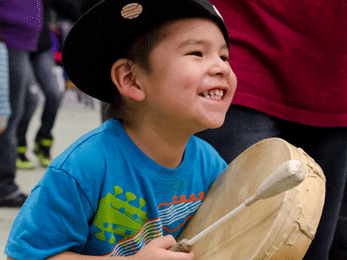We are committed to reconciliation with Indigenous peoples and communities
We acknowledge our obligation to improve the health and wellness outcomes of Indigenous people in our region, and are committed to taking action to bring about change. We do this by building staff capacity to deliver culturally safe services, cultivating equitable and productive relationships with Indigenous partners, addressing racially-based health inequities by disrupting colonial practices within and outside our organization, and by building an organizational culture of humility and accountability through ongoing learning, thoughtful policy, and practice that is informed by multiple evidence sources. We continue to work towards full implementation of Taking Action for Reconciliation: An Organizational Plan for the Middlesex-London Health Unit.
Land Acknowledgment
We acknowledge that the Middlesex-London Health Unit is on Indigenous land that has been inhabited by Indigenous peoples for thousands of years. There are longstanding relationships of the three local First Nations groups of this land and place in Middlesex County and the City of London. The three First Nations communities closest in proximity to Middlesex County and the City of London are: Chippewa of the Thames First Nation (part of the Anishinaabe); Oneida Nation of the Thames (part of the Haudenosaunee); and, Munsee-Delaware Nation (part of the Leni-Lunaape).i
As settlers, we're grateful for the opportunity to be here and we thank all the generations of people who have taken care of this land - for thousands of years. Long before today, there have been the first peoples of Turtle Island who have been the stewards of this place. In particular, we acknowledge the traditional territory of the Anishinaabe, Haudenosaunee, Attawandaron (Neutral), and Wendat peoples. This area was originally governed by the Three Fires Confederacy consisting of the Odawa, Pottawatomi, and the Ojibway. This territory is covered by the Upper Canada Treaties. We recognize and deeply appreciate their historic connection to this place.
It later became home to other nations who now call this place home. Considering this, we also recognize the contributions of Métis, Inuit, and other Indigenous peoples have made, both in shaping and strengthening this community in particular, and more widely in what is known today as the province of Ontario and country of Canada. As settlers, this recognition of the contributions and historic importance of Indigenous peoples must also be clearly and overtly connected to our collective commitment to make the promise and the challenge of Truth and Reconciliation real in our communities.
That is to say, our words are insufficient and need to be connected to real and meaningful action that contributes to improving the health and wellbeing of Indigenous people. In the Public Health context, examples of actions include, improving the state of Indigenous population health data, having programming that reflects Indigenous ways of knowing and doing, hiring Indigenous staff, as well as using our power and influence to shape public policy in ways that support the wellness and self-determination of Indigenous communities.
i Pronunciations
Anishinaabe (Ah-nish-na-baye)
Haudenosaunee (Ho-deh-no-show-nee)
Attawandaron (At-ta-won-da-ron)
Wendat (Wan-dat)
Odawa (O-dow-wa)
Pottawatomi (Pott-a-wat-omi)
Ojibway (O-jib-way)
